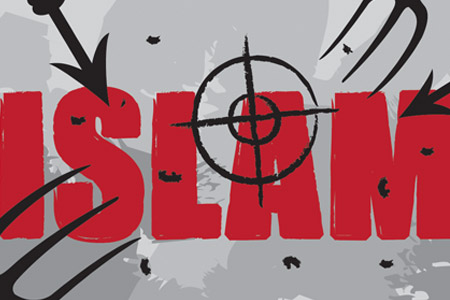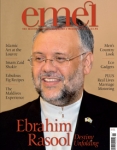
Sticks and Stones
Issue 98 November 2012
What should be our reaction in the face of provocation?
The issue of how to deal with ‘insults to Islam’ has become a recurring discussion in Muslim circles. Spurred on in recent years by cartoons depicting the Prophet, burning of the Qur’an, and that YouTube video; the latest disturbances have created a global uproar—demonstrations in tens of countries, over a dozen lives lost, embassies attacked, whole nations blamed for the actions of a fool. What’s going on?!
The love and passion that Muslims have for Muhammad is well known to themselves, and yet perhaps one of the most misunderstood things outside of Islamic circles. This is more than an ordinary pre-occupation with blasphemy—the Persian couplet hit the nail on the head when it said: “Take liberty with God if you wish, but be careful with Muhammad!”
Muslims may well perceive an insult to the Prophet as an injustice, but we need to ask serious questions when we react to such provocations and what the actual priorities should be? After all, where is this energy when it comes to other cases of injustice, for example the ongoing conflicts in Syria or Bahrain? Can this energy be channelled in more productive ways? Why is it (nearly) always destructive?
A piece of advice from the Prophet himself may help us to set some sense of context and proportion: “Shall I tell you of something that is better than fasting, prayer and charity? It is mending discord between people. Beware of hatred—it strips you of your religion.”
Islam gives us many other more direct teachings of how we should react in the face of insult. When the Prophet was stoned and chased out of Taif his reaction was not to ask God for the destruction of the people, but to pray for their guidance. The Qur’an teaches us: “…and argue with them in ways that are better…” (16:125). It also reminds us that, “not equal are the good deed and the bad, repel [the bad] with good…” (41:34) If we repel evil with evil, then only evil can prevail.
The Qur’an also teaches us not to curse the deities of other religions in retaliation to their insults. The fact is, that which is central to our faith—God, the Prophet, the Qur’an, etc. don’t need defending. If we are faithful, what could any human being do or say that would undermine our faith in them, or cause any actual hurt to them? Violent, inflamed defence does nothing but lend credibility to the accuser.
Over the last few weeks some Muslims have called for blasphemy laws to be introduced in various countries. However, it strikes me that the insult that Muslims often feel in such situations and the violent reactions demonstrated, stem from a deep sense of insecurity—perhaps related to a post-colonial history, disillusionment with the ethics of global politics today, estrangement from the spirituality of their own religious traditions, identity politics, etc. Blasphemy laws, or indeed any laws, will not resolve such deep problems.
Blasphemy laws were repealed from the UK in 2008 because they had become out-dated. The last imprisonment under those laws took place in the 1920s. Instead laws have been introduced to protect people (incitement to religious hatred, for example) and not religions. Balancing the right to free speech and the potential for causing offence are not easy. These are complex tensions that every society grapples with and there is always a need for some boundaries in the law to prevent exploitation and injustice especially of the weak and vulnerable. Ideas and beliefs do not need defending, but people do.
One would of course wish for, and expect, decorum and civility in public discourse. The challenge is how do you react when the criticisms against your beliefs are crude or are deemed offensive?
Human societies have now grown to value the importance of free speech and probing enquiry. It is also worth noting that much of the position that Muslims have carved out—religious freedom, anti-discrimination and equality—is built on the foundation of notions such as freedom and human rights.
While we continue to urge decorum, arguments are better aired, rather than pushed underground. People are afraid of Islam and Muslims. We need to face up to that. We will not defeat this fear nor deal with people’s prejudices and anxieties by merely asking for restrictions on what they can express. Instead we need more freedom for people to debate, discuss and bring out whatever anxieties they have. Only when we nurture a climate of open discussion (and yes, some of that will be bitter and difficult for us to hear) can we even stand a chance of dealing with the concerns that people have. l
Dilwar Hussain is President of the Islamic Society of Britain.
Bookmark this |
|
Add to DIGG |
|
Add to del.icio.us |
|
Stumble this |
|
Share on Facebook |
|
Share this |
|
Send to a Friend |
|
Link to this |
|
Printer Friendly |
|
Print in plain text |
|


Comments
0 Comments